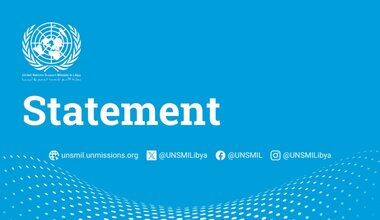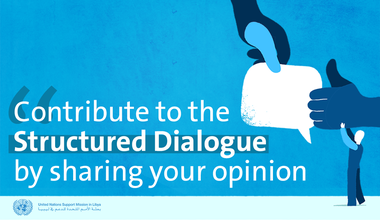Statement of SRSG Martin Kobler to the Security Council 2 March 2016
“Time to act in unity. Time to take responsibility for peace.”
Thank you, Mr. President.
Mr. President, Distinguished Members of the Council
First of all, let me congratulate Angola on taking up the presidency of the Security Council for the month of March.
The members of the Council have before them the latest report of the Secretary-General on the activities of the United Nations Support Mission in Libya (UNSMIL), which details the work of the Mission over the past six months.
Mr. President,
The process towards a democratic transition has continued to meet a number of milestones but at the same time remains very precarious.
Two weeks ago, on 17 February, Libya marked the fifth anniversary of the 2011 revolution.
However, five years on, the current political and military vacuum is allowing terrorist groups and criminal networks to establish deep roots.
It has to be said in all clarity, Libya today has no effective state institutions.
Mr. President,
It is with a very heavy heart that I begin my briefing to you noting that the humanitarian situation in Libya has deteriorated further, against the background of poor funding for the humanitarian response plan.
Libya is a country of six million people, with significant resources.
But, across the country, 2.4 million people are in need of some form of humanitarian assistance.
More than 40 per cent of the health facilities in Libya are not functioning.
Over one million children under the age of five are at risk of being affected by a vaccine shortage.
Some 1.3 million people are food insecure.
It is now imperative that Libyan political actors take responsibility in the higher interest of the Libyan people to stop human suffering.
Mr. President,
The overwhelming majority of the Libyan people are in favour of the Libyan Political Agreement. The overwhelming majority support the formation of a Government of National Accord that effectively address the existing threats and the overwhelming majority want and deserve peace – now.
Some of those politically responsible on both sides, however, still refuse to listen to the voices of the Libyan people and pursue their own narrow political interests.
In my last briefing to the Security Council, I promised to broaden the basis of support to the Libyan Political Agreement. My colleagues, myself and the international community persistently reached out to those who are opposing the Libyan Political Agreement.
However, until now we are unable to convince them entirely to go the way of peace and unity.
On January 15th, the Presidency Council presented a cabinet for approval by the House of Representatives.
The House of Representatives voted to endorse the Libyan Political Agreement in principle, but it requested the Presidency Council to nominate a new and smaller cabinet.
After days of tireless deliberations, on 14 February the Presidency Council finalized a new list of candidates for a streamlined cabinet.
Few days ago, on 22 February, the House of Representatives met to consider the Presidency Council’s second cabinet. However, its session was interrupted by a minority of parliamentarians who opposed the vote, and resorted to threats and intimidation preventing the majority to freely express its vote.
Nonetheless, this majority gathered 100 signatures in support of the endorsement of the new cabinet and its programme.
I am convinced that a positive vote could have taken place on 22 February, had the leadership of the House of Representatives shown the resolve and determination to put the Government of National Accord to a vote.
I have therefore written to the Speaker of the House of Representatives to register the will of the democratic majority, and formalize its endorsement of the Government of National Accord.
Failing such recognition and a positive endorsement by the House of Representatives by early next week, Libyans have to go on. I intend to reconvene the Libyan Political Dialogue to explore the way forward in line with the Libyan Political Agreement.
Mr. President,
Libya cannot be held hostage by minorities in the House of Representatives and the General National Congress. In both these forums, there are clear majorities who are in favour of moving ahead quickly with the establishment of a Government of National Accord. The country needs to move ahead now, or risk division and collapse.
I therefore intend to proceed along the following lines:
First: together with the Libyans and international community we will continue to advocate for the implementation of the Libyan Political Agreement. This is the plan there are no alternatives.
The Government of National Unity as proposed by the Presidency Council must be allowed to take up its duties in Tripoli as soon as possible.
Those who are threatening the Presidency Council and actively preventing it from assuming power in Tripoli should be held accountable on the basis of Security Council resolutions.
Branches of the government however should be established in eastern Libya, where Benghazi requires particular attention, and in the South.
I thank President Fayez Serraj for his perseverance and steadfastness in the last weeks. I encourage all members of the Presidency Council to stand together in unity.
I call on the country’s political leadership to support and stay the course outlined in the Libyan Political Agreement.
I welcome the preparatory meetings of the State Council and I am looking forward to the first official meeting of the State Council in Tripoli as soon as possible.
Second: given the security situation and the expansion of Daesh, it is imperative to unify and reform Libyan security forces. I urge the Presidency Council and the Government of National Accord to immediately establish a mechanism to achieve this goal. The international community and UNSMIL stands ready to assist.
Third: the support of the Libyan Political Agreement has to be broadened. This requires a parallel, complementary, and bottom-up approach. The support of civil society, youth, and women organizations has to be further deepened. Tribal dignitaries and municipalities have a crucial role to play. I intend to work with the relevant authorities responsible for national reconciliation in the new Government of National Accord to arrange for regional fora of tribal leaders and mayors to accompany the process of nation-building. This may later result in a nation-wide “Grand Shura”
Fourth: in parallel, the Constitutional Drafting Assembly should present the Draft Constitution on time for a referendum. To this end, I am grateful that the government of Oman has offered to host a retreat. I urge all members of the Constitutional Drafting Assembly, including the boycotters, to seize this opportunity and resolve the outstanding issues.
Mr. President,
Both in eastern and western Libya, there are those who are committed to do everything in their power to undermine the political process, as well as the formation of a Government of National Accord and its instalment in the capital.
These actors must be told in no uncertain terms that enough is enough: it is high time that they stand by the interests of the Libyan people and not against them.
Coming to security questions, while the political process is extremely slow, Daesh takes advantage of the political and security vacuum and is expanding to the West, East and to the South. While Libya’s financial resources are dwindling, the criminal networks, including human smuggling, are booming.
The conflict in Benghazi escalated in the last days when forces under the banner of the “Libyan National Army” commenced new offensive operations against the Benghazi Revolutionary Shura Council and Daesh. These forces have since gained control of several areas previously held by the Shura Council, and succeeded in dislodging Daesh from a number of key neighbourhoods it previously controlled.
Many displaced as a result of the conflict in Benghazi have returned to their old neighbourhoods and reclaim their homes. However, I am deeply concerned at unconfirmed reports of human rights violations in some areas overtaken by the Libyan National Army.
Mr. President,
Let us not forget that as a result of the violent conflict, significant parts of Benghazi lies today in ruins. The establishment of a humanitarian ceasefire, delivery of humanitarian aid, a reconstruction trust fund for Benghazi must be a priority for the new Government.
In southern Libya, the national-level conflict and absence of a functioning security apparatus continues to exacerbate local intercommunal tensions. Intermittent clashes continue in Sabha and Kufra.
The fragmentation of security actors and their preoccupation with consolidating their influence in areas under their control has allowed Daesh to operate unchecked in many places. The airstrike against Daesh in Sabratha on 19 February has been followed by escalating clashes as local security forces and armed groups sought to evict Daesh from the town.
During an assault last week, Daesh killed 17 people, beheading several of them.
Daesh has also continued to carry out multiple beheadings and atrocities in their stronghold, Sirte.
Daesh in Libya constitutes an urgent and growing threat to Libya, the region and beyond. However, the fight against violent extremism can only be sustainable if it is led by a national unity government that puts in place and prioritises a national agenda to address the country’s most immediate challenges and works to meet the aspirations and expectations of the Libyan people.
Mr. President,
On 13 January, the Presidency Council established a Temporary Security Committee to facilitate the implementation of the security arrangements outlined in the Libyan Political Agreement. UNSMIL is supporting the Committee in its efforts to formulate a viable security plan that enables the Government of the National Accord to establish itself in Tripoli.
In western Libya, however, our efforts have been severely impeded by the consistent denials of UN overflight and landing permission by the Tripoli-based authorities. Since the beginning of December 2015, practically all our requests, with few exceptions, to travel to Tripoli and surrounding areas have been refused.
On Human Rights, the Mission continues to document numerous cases in which armed groups across the country have abducted civilians on account of their identity, political affiliations or simply for ransom. Those seized are often at risk of torture and other ill-treatment. I welcome the recent establishment of a committee by the General Prosecution to review the cases of all those detained at the Mitiga airbase in Tripoli.
Mr. President,
I have continued to strongly advocate increased women participation in Libyan political life, in particular by calling for a 30 per cent share of ministerial posts in the Government of National Accord. Sadly, my calls have not been heeded.
Mr. President,
Libya’s neighbours, are suffering direct consequences of the country’s instability. I am committed to fully engage with them in reaching a political solution to the crisis. I would like to thank Tunisia for continuing to host UNSMIL temporarily in their capital, and the other countries in the region for playing an important role in building consensus.
I am deeply appreciative of the efforts of the African Union, the European Union and the League of Arab States. I congratulate President Kikwete on his appointment as High Representative of the African Union for Libya. I have met him on 26 February and I look forward to our close cooperation.
I would like to thank in particular this Council, for their close engagement and unanimous support for a political resolution of the crisis in Libya.
I would finally like to thank the staff of the United Nations Mission in Libya for their tireless efforts and dedication in supporting the Libyan political process.
Despite the many hurdles and difficulties and frustrations in the daily work, they are greatly professional and committed colleagues, and I am very grateful to them.
Thank you.
 United Nations Peacekeeping
United Nations Peacekeeping UN
UN









